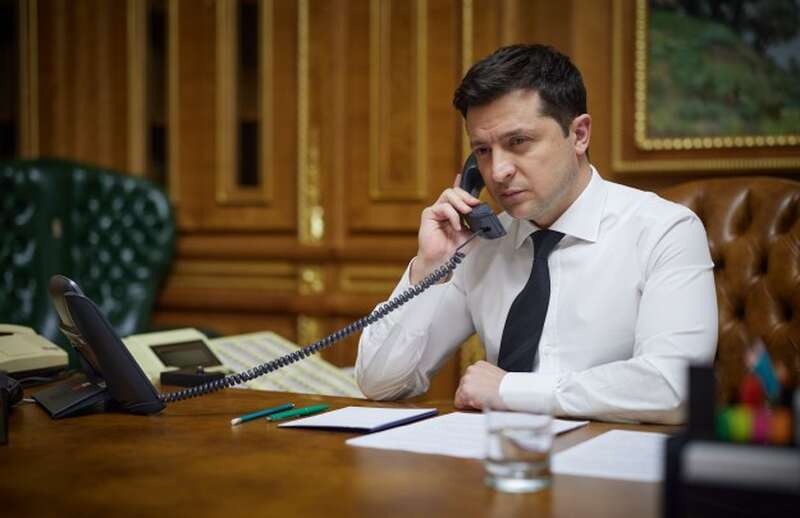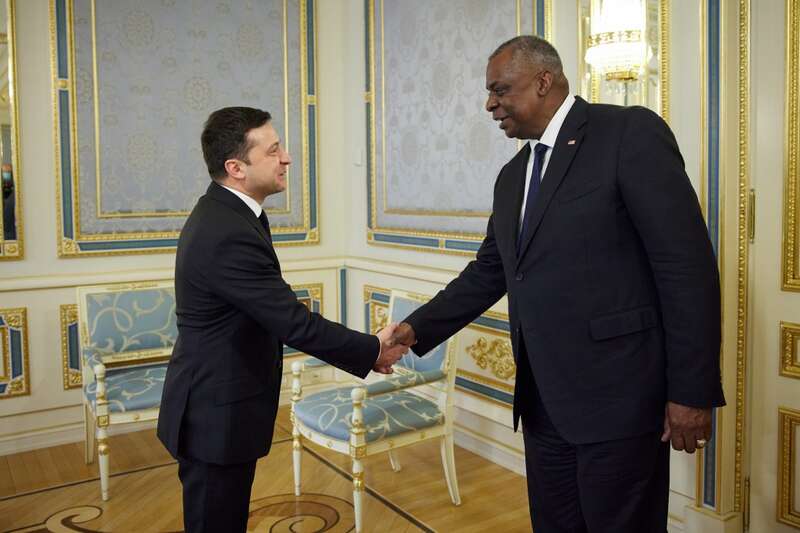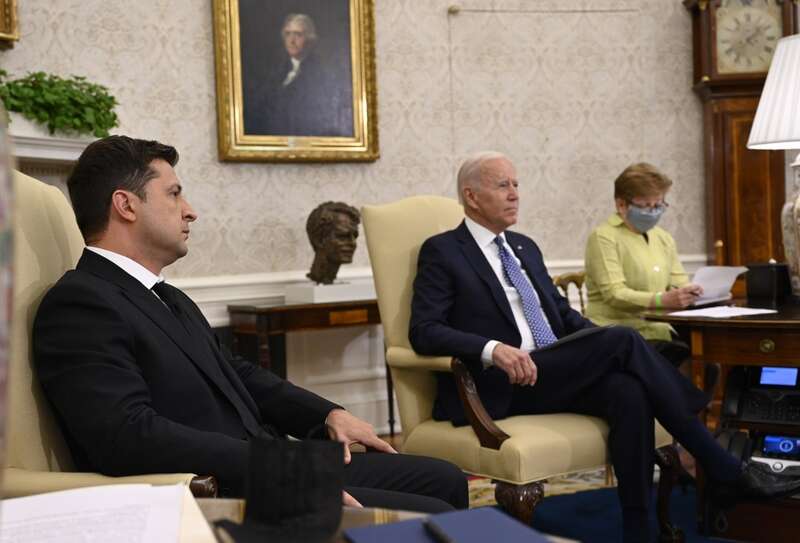Ukraine has reason to be nervous about the direct talks between Biden en Putin about Russia's security issues. In spite of reassurances, Ukraine doesn't know if Biden made some promises at Kyiv's expense. President Zelenskiy's room for maneuvring is limited, as the Ukrainian society opposes any concession to Moscow, writes Mike Eckel for Radio Free Europe.
 President Zelenskiy last week speaking with president Biden, two days after Bidens videomeeting with Putin.. Photo: president.gov.ua
President Zelenskiy last week speaking with president Biden, two days after Bidens videomeeting with Putin.. Photo: president.gov.ua
by Mike Eckel
As White House phone calls go, the one that Ukraine's Volodymyr Zelenskiy had last week may end up being among the most consequential of his presidency.
And it's certainly not the first time U.S. President Joe Biden has held a tough conversation with his Ukrainian counterpart on the subject of Russia.
Zelenskiy spent 90 minutes on the phone with Biden on December 9 - a call aimed at discussing Biden's conversation two days earlier with the man who has deployed tens of thousands of troops near Ukraine's borders: Russian President Vladimir Putin.
Biden, who earlier ruled out sending U.S. troops to Ukraine in the event of a new invasion, reaffirmed the United States' 'unwavering commitment to Ukraine's sovereignty and territorial integrity,' according to the White House.
Publicly, Putin's implicit threat of war focuses primarily on the prospect of Ukraine someday joining NATO. But Putin's warnings also concern the running seven-year war in eastern Ukraine, whose resolution has been stymied by fundamental disagreement over implementing the only proposed peace deal, broadly known as the Minsk accords.
Did Biden promise Putin concessions?
So what exactly did Biden tell Zelenskiy? Is he seeking concessions from Kyiv, as at least one report suggested? And has he promised concessions to Putin at Ukraine's expense, as at least one other report suggested?
'That's the big question,' said Orysia Lutsevych, head of the Ukraine Forum in the Russia and Eurasia Program at Chatham House, a London think tank. 'To be honest, it only makes sense from a negotiating perspective to ask, to probe what legitimate concessions are the Ukrainians ready to make? That's a question that the Ukrainians need to be asking,' she told RFE/RL. 'What kind of compromise can you make to avoid war?'
Publicly and privately, the White House says most certainly not: Biden did not ask Zelenskiy for concessions, and he pledged that Washington and European allies would hit Russia with heavy economic sanctions if it launched a new offensive.
'I know there's been lots of churn in the press about whether or not there were concessions. There very clearly were not,' spokeswoman Jen Psaki said on December 9. 'I think President Biden has made very clear that he stood by our principles.'
Biden 'made very clear that one nation can't force another nation to change its border, one nation cannot tell another to change its politics, and nations can't tell others who they can work with,' a senior administration official told reporters later.
In Kyiv, Zelenskiy administration officials were largely upbeat in their portrayals, asserting that Biden was supportive of Ukraine's eventual membership in NATO, something that the Kremlin has viscerally, and publicly, opposed.
'President Biden has made it very clear that Ukraine's decision to join NATO is only a decision of the Ukrainian people, a sovereign and independent Ukrainian state. And he was not even ready to discuss this issue. And it depends on Ukraine and NATO members,' Andriy Yermak, Zelenskiy's chief of staff, told a Ukrainian talk show.
One of the risky signals to come out of the call, says Maria Zolkina, a political analyst at the Kyiv-based Democratic Initiatives Foundation, is that the United States was ready to get more deeply engaged in the process to resolve the war in eastern Ukraine's Donbas region. That means negotiating directly with Russia, she said, which puts Ukraine at risk of being left on the outside.
'If we are not at the table, we are out of the process,' she told RFE/RL.
The senior U.S. administration official sought to alleviate such concerns: Biden 'made crystal-clear to Zelenskiy in his call today...that if Ukraine is on the agenda, then Ukraine is at the table.'
Zelenskiy's position has hardened
Today, the only existing path for resolving the war in the Donbas is laid out in the Minsk accords -- truces signed in September 2014 and February 2015 that provide a framework, albeit a disputed one, for a peace deal.
The devil is in the details: How and when to pull back on both sides; how and to whom Kyiv would grant amnesty; how and when Ukraine would hold local elections in separatist-controlled regions and grant them special status; how and when Kyiv would regain full control over its border with Russia in those areas.
One big problem is that neither Kyiv nor Moscow believes the other is negotiating in good faith. Russia's continued denial of involvement in the fighting in eastern Ukraine, despite overwhelming evidence to the contrary, doesn't help either.
 The American Secretary of Defensie, Lloyd Austin, visited Kyiv on October 19. Photo: president.gov.ua
The American Secretary of Defensie, Lloyd Austin, visited Kyiv on October 19. Photo: president.gov.ua
Zelenskiy himself won a landslide election in 2019 on a platform that included ending the war. He had some small early victories that initially boded well for a resolution: Five months after his election, Zelenskiy secured a prisoner swap with Russia, with 35 Ukrainians who had been held by Russia, some for years, being returned home.
Since then, however, Zelenskiy's position toward Russia more broadly has hardened, apparently causing ire in the Kremlin. His government has gone after a powerful oligarch whose media holdings frequently showcase a pro-Russian bias and who has long been seen as a back-channel conduit for Moscow.
Zelenskiy, who has the right to seek a second term in 2024, has also more frequently started calling for Ukraine to join NATO, fueling Moscow's fury.
A day after his video conference with Biden, Putin again hammered home Russia's position on the issue -- even though NATO has given no sign that Ukraine will be invited to join for years.
'We are concerned over the prospects of Ukraine's possible accession to NATO, as it will definitely result in the deployment of military contingents, bases and weapons posing a threat to us,' Putin said.
Noting that U.S. missile-defense systems are being deployed in Poland and Romania, Putin said that Russia had 'every reason to believe that the same will happen if Ukraine joins NATO, but on Ukrainian soil. How can we not think about it? To impotently watch what happens would be a criminal omission from our side.'
High-level meetings
It was not only Ukrainians who were made nervous by Biden's call with Putin. During the call, according to White House and Kremlin readouts, the two leaders agreed to arrange future talks on issues including Russian complaints about NATO. Biden later said he hoped the White House would soon announce high-level meetings between Russia and the United States, along with four major NATO allies.
That ruffled feathers among NATO members in Eastern and Central Europe that are acutely sensitive to menacing moves by Moscow, prompting Biden to make another call with a group known as the 'Bucharest Nine,' which includes the Baltic states and Poland.
One Polish diplomat who spoke on condition of anonymity said Warsaw was afraid that the U.S. approach regarding Ukraine was being made over the heads of Ukraine and other Central and Eastern European countries. And it came just a few months after the White House decision to not impose sanctions on the nearly completed Russian pipeline Nord Stream 2 -- which also irked some NATO members.
'No To Capitulation'
Biden and Zelenskiy have spoken at least twice previously, once in person, for talks that have all featured Russia.
In June, the Biden White House opted not to impose sanctions on Nord Stream 2, the Baltic Sea pipeline allowing Russia to send more gas to Europe while circumventing Ukraine's pipeline network. Zelenskiy was publicly angered, resulting in a phone call with Biden just prior to Biden's summit meeting in Geneva with Putin.
In September, Zelenskiy was hosted at the White House, where Biden and other U.S. officials assured him of strong U.S. support. The meeting later resulted in a new 'strategic partnership' that included specific cooperation on defense issues.
 Zelenskiy visited the White House on September 1 2021. He was assured of strong support. Photo: president.gov.ua
Zelenskiy visited the White House on September 1 2021. He was assured of strong support. Photo: president.gov.ua
But since then, Moscow has menaced Ukraine, dispatching tens of thousands of troops -- possibly more than 100,000 -- to regions near Ukraine's borders and to Crimea, the Black Sea peninsula that Russia seized in 2014.
For some harder-line segments of Ukrainian society, even the perception of concessions is a trigger. In late 2019, tens of thousands of Ukrainians jammed Kyiv's streets in opposition to Zelenskiy's support of a diplomatic plan known as the Steinmeier Formula. Some carried banners reading 'No to capitulation.'
Ukrainian society wants referendum on NATO-membership
And attitudes within Ukrainian society have hardened further since 2019, Zolkina says. Strong majorities oppose amending the constitution to give special status to the eastern regions controlled by Kremlin-backed separatists, or conducting elections there without specific preconditions, she notes.
Strong majorities also oppose giving up Ukraine's right to seek NATO membership, or allowing local law enforcement or security agencies in the separatist-held areas to be comprised solely of local inhabitants.
In a report released earlier this year -- well before the current Russian troop buildup -- the Razumkov Center, an independent Kyiv think tank, found that 70 percent of Ukrainians supported a public referendum on NATO membership.
And another poll released last week showed that 54 percent of respondents believed the Minsk accords needed to be revised or renegotiated. The poll also found that 56 percent of respondents favor direct negotiations with Russia; 41 percent opposed. The Kremlin says Kyiv must talk with the separatists, not with Moscow.
The poll by the Kyiv survey group Reiting surveyed 2,500 Ukrainians between December 6-8 and had a margin of error of 2 percentage points.
'If you ask Ukrainian society, this is a war of aggression against Ukraine,' Lutsevych said. 'They understand that it's about independence, it's not about security or neutrality.'
This article was published originally by Radio Free Europe/Radio Liberty. With reporting by Rikard Jozwiak.
